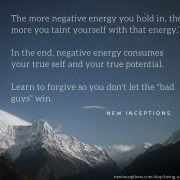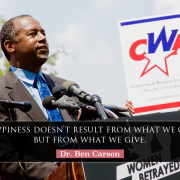Breaking out of the Scarcity Mindset By Applying the Law of Abundance
“Whether you believe you can or believe you can’t, you’re right.” – Henry Ford
“Life is just a mirror, and what you see out there, you first see inside of you.” – Wally Amos
A Few Definitions:
(I’ll meet you on the other side of them.)
Law of Attraction:
States that you attract what you focus your attention on – whether positive or negative. Think of ways that the law of attraction affects your life right now. Do you regularly think of how you fail with the opposite sex? This will result in you continuing to fail.
The same is true of wealth, happiness, success in your career and anything else you focus on.
Your mind has the power to manifest that which you strongly believe. When you focus on something strongly enough, you make it a reality, so our goal is to harness that power to create a better life.
Law of Scarcity:
An economic system cannot produce all goods and services that consumers want, and most consumers do not have the resources to purchase everything they want. Furthermore, choices must be made about how limited resources (time, money, etc.) are used.
Law of Abundance:
A sub-law of the Law of Attraction. It states that there is enough wealth in the world for everyone to have enough money and resources to live fulfilling lives.
First Thing’s First
I want you to know that this particular post might be confusing. In fact, I’m writing the thing and I still find it confusing. However, if there’s anything I want you to get from this post it’s this:
“Whatever the Mind can see and believe, the Mind can achieve.” – Napolean Hill
Of Nature and Man
“The Creator did not intend for us to be scrubs, and certainly that is not the example that he sets for us.. The essence of the Law of Abundance is that we must believe in abundance.” – Sterling W. Sill
When the Founding Fathers made the Declaration of Independence, they wrote Man had certain Rights. Specifically they wrote, “they are endowed by their Creator with certain unalienable Rights, that among these are Life, Liberty and the pursuit of Happiness.”
Now let me pose a question to you.
Since many of us believe that Natural Laws are how the Creator governs, wouldn’t it make since that what goes for Nature should be good for Man?
I’m not saying that we should go total caveman and not have laws that Man makes up as we go. Instead, I’m simply saying that Nature’s laws are the foundation of how the world works and Man’s laws fill in the gaps from there. We can’t change how Nature works – so why try?
Imperfect Laws of Man
If Nature is so abundant (which it is, take anything that produces fruit for example), why is it that we limit ourselves to a world of scarcity? I believe it’s because we choose not to live by Nature’s laws but instead, by Man made laws. (In fact, we’ve been moving farther and farther away from Natural Laws.)
The problem with doing that is because Man, as we know, is imperfect. And because he’s imperfect, he’s going to make imperfect laws. Most laws that we create will ultimately cause some other problem that we’ll have to create another law for OR we’ll have to get rid of the previous law all together (Prohibition anyone?).
Take the tax code for example. It could have started off simple but as years go by, it has gotten larger and larger. Why? Because tax, in itself, isn’t natural. So we’ve had to fill in ever smaller and smaller gaps.
Another man made law that’s obviously imperfect and that we’re all familiar with is segregation. Whoever thought that separating people because of their skin color was a good idea was just straight out wrong.
Scarcity is one of these laws as well. Does Supply and Demand makes sense? On the surface it might. I mean, as supply goes down, demand goes up. Wait a second. Was it that when demand goes up that supply goes down? That doesn’t seem right either.
Hmmm… well let’s take a look at an example we’re familiar with: gas prices.
A few years ago, gas was hovering at nearly $4 a gallon here in the States. This was because OPEC wanted as much money as they could get. Demand stayed the same, supply fell, thus the price rose. Ok. Makes sense for them to cut the supply from their perspective. However, now at $2.25 a gallon, we’re seeing OPEC produce like there’s no tomorrow. Why is that? Many sources say it’s because no one can agree on a universal price point. Others might say that they want to cripple other countries around the world including Russia, China, Canada, and the US.
Either way, it’s human intervention. Just by definition, it’s imperfect if not downright confusing!
(Actually, I might go out on a limb and say that Scarcity isn’t a law in itself, it’s actually a lack of law or lack of understanding in how the Law of Abundance works.)
Applying the Law of Abundance (or Attraction)
Now that we’ve looked at why Natural Laws are the laws that we should have high interest in following and why Man made laws are just plain ridiculous at times, let’s look at how we can actually APPLY the Law of Attraction in our lives.
For one, I’m not about to tell you that you simply need to focus on what you want in your life. If only it were that simple. I mean, I love Napoleon Hill, but dude, c’mon. Just thinking about something all day is called day dreaming. Besides the focus, you have to act.
So what kind of actions am I talking about?
First, you need to create a Vision Board (or have a REALLY good idea of what you’re looking for). Not sure how to make one? Next, you need to create a plan to get there. After that, you have to do that work. (If you’re just doing work to do work, then you better be following someone else’s plan or you might find yourself going in circles.)
Scenario 1 – The New Graduate: Let’s say you want to start simple at getting a good job out of school. What is it going to take to get you there? Four things: Good grades in college, a good resume and cover letter, and… NETWORKING! You’ve probably heard of all of these at some point and yes you have to do them all, but the one you really need to create a plan for is networking. If you’re desired job is to work for say… Facebook, how are you going to get there? It’s just not going to happen. Who do you need to talk to? Get that Vision Board going (start with a big ol’ picture of Facebook HQ) and then start working back to where you are now. This is going to involve research in who you should talk to and what job fairs you need to go to, but it’s totally doable.
Scenario 2 – Career Transition: Alright, you’ve had your first job and you want to make a larger impact. What next? Wait to be promoted? Leave the company? Start your own business? Join another startup first? There’s different ways you could go here. Let’s say we want to start our own business but we don’t know if we can handle it. Great, let’s join another startup for a couple of years and get some experience. (Hey, it’s what I did!)
Preferably, you shouldn’t join a company that does what you want to do. Otherwise, you might burn some bridges when you leave (if that’s your plan). But just like the first time, let’s get that job with a plan. Another thing you might consider here is if you want to be a full time employee or work as a 1099 contractor. As a full time employee you’ll have benefits, but you’ll have less options to do outside work. As a contractor, you’ll be in charge of ALL your taxes, but you’ll be able to write off expenses. There’s pros and cons in both.
Scenario 3 – Start Your Own Business: Time to start your own business! Some things to consider here: what kind of business is it going to be? How much would you like to be making? Are you looking at a deep foundation (like I am with New Inceptions)? Are there any similar businesses out there that you can model after?
These are all things you’ll need to think about. If there are similar businesses out there, see if you can’t do some research in how they got from point A to point B. If it’s an online business, use the Way Back Machine to see if you can get some clues in how they started. If you’re doing something new or just want a community to help you, you might want to consider joining Fizzle to help you out. If you’re planning on going old school brick and mortar, do some market research first. Is there an interest in your area of what you’re doing? Would it be best if you started elsewhere? Maybe start online first and then go brick and mortar? Lots of choices.
Either plan you go, you need to put in the work. And we’re here for you anytime you need help in figuring out the next step.
Homework:
So which scenario above best describes you? If you don’t think any of them do, let us hear what your particular situation is. Also, feel free to let us know how you’ve used the Law of Abundance (or Attraction) to get ahead in the past or how you’re currently using it!








